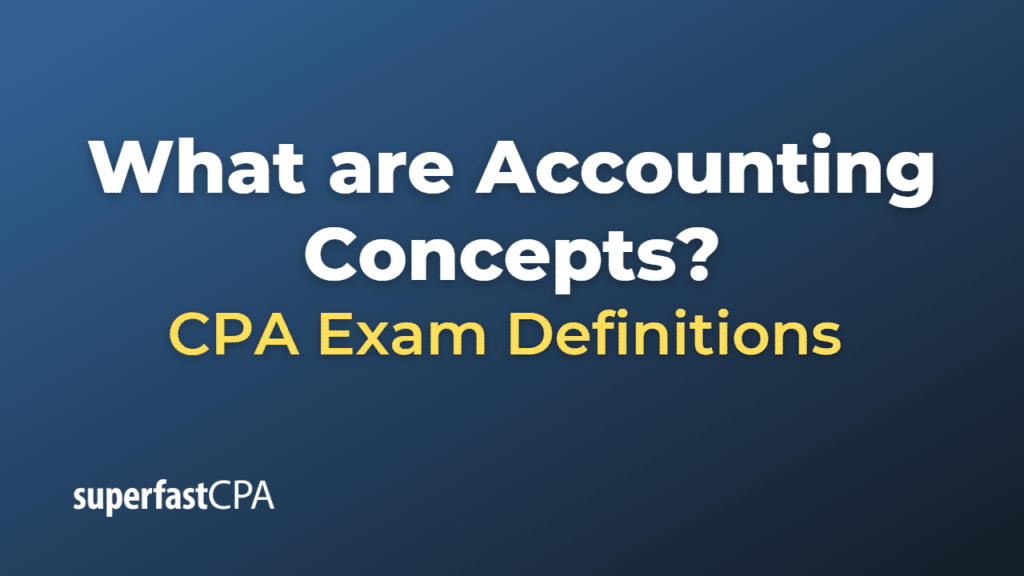Accounting Concepts
Accounting concepts, also known as accounting principles or assumptions, are the fundamental rules and guidelines that form the basis for recording, analyzing, and reporting financial transactions in accounting. These concepts provide a standardized framework that helps ensure consistency, reliability, and comparability of financial statements across different organizations and time periods. Some of the most important accounting concepts include:
- Accrual Concept: This concept states that financial transactions should be recorded when they are incurred, not when the cash is received or paid. This approach helps match revenues with the related expenses in the same accounting period, providing a more accurate picture of a company’s financial performance.
- Consistency Concept: According to this concept, organizations should consistently apply the same accounting policies and methods across accounting periods. This consistency helps make financial statements comparable over time and simplifies the analysis of financial trends.
- Going Concern Concept: This principle assumes that a business will continue operating in the foreseeable future, allowing for the deferral of certain costs and the allocation of assets’ costs over their useful lives. If there is a significant doubt about a company’s ability to continue as a going concern, this must be disclosed in the financial statements.
- Prudence Concept: This concept emphasizes caution in financial reporting, ensuring that uncertainties and risks are taken into account. Revenues and assets should not be overstated, while liabilities and expenses should not be understated. This approach helps provide a more conservative view of a company’s financial position and performance.
- Matching Concept: This principle requires that expenses be recognized in the same accounting period as the revenues they generate. By matching revenues and expenses, the matching concept helps provide an accurate representation of a company’s profitability.
- Materiality Concept: According to this concept, financial statements should include all material information that would influence the decision-making of users. Information is considered material if its omission or misstatement could impact the economic decisions of financial statement users.
- Entity Concept: This principle states that a business is a separate economic entity from its owners, and its financial records should be maintained separately from the personal financial records of the owners. This separation helps ensure the accuracy and integrity of financial reporting.
- Monetary Unit Concept: This principle assumes that all financial transactions should be recorded and reported in a stable currency, such as the U.S. dollar, without adjusting for inflation or changes in purchasing power. This concept simplifies financial reporting but may not always reflect the true economic value of certain assets and liabilities in times of high inflation.
These accounting concepts serve as the foundation for preparing, interpreting, and analyzing financial statements. By adhering to these principles, businesses can ensure that their financial statements are accurate, reliable, and comparable, providing valuable information to investors, creditors, and other stakeholders.
Example of Accounting Concepts
Let’s consider a fictional example of a small landscaping company called “Green Gardens” to illustrate how various accounting concepts are applied in practice.
- Accrual Concept: Green Gardens performs a landscaping job for a client in December 2023 but does not receive payment until January 2024. According to the accrual concept, the company records the revenue in December 2023 when the service was performed, not when the cash is received.
- Consistency Concept: Green Gardens has been using the straight-line depreciation method for its equipment. In 2023, the company purchases additional equipment but decides to continue using the straight-line method, ensuring that its depreciation methods remain consistent across accounting periods.
- Going Concern Concept: Green Gardens expects to continue operating for the foreseeable future. Therefore, the company depreciates its long-term assets over their useful lives and classifies its liabilities as short-term or long-term based on their maturity dates.
- Prudence Concept: Green Gardens has an outstanding invoice from a client who is experiencing financial difficulties. To exercise prudence, the company creates an allowance for doubtful accounts, acknowledging the potential risk of not receiving the full payment.
- Matching Concept: In December 2023, Green Gardens incurs fuel expenses for vehicles used in various landscaping jobs. The company recognizes these expenses in December 2023, matching them with the revenues generated during the same period.
- Materiality Concept: Green Gardens accidentally omits a $50 expense for office supplies from its financial statements. Since this amount is not material to the overall financial position or performance of the company, its omission does not significantly impact the decision-making of financial statement users.
- Entity Concept: Green Gardens maintains separate financial records for the business and its owner. The owner’s personal expenses, such as a family vacation, are not included in the company’s financial statements.
- Monetary Unit Concept: Green Gardens records all financial transactions in U.S. dollars and does not adjust its financial statements for inflation or changes in purchasing power.
In this example, Green Gardens applies various accounting concepts to ensure that its financial statements are accurate, reliable, and comparable. By adhering to these principles, the company provides valuable financial information to its stakeholders, such as investors, creditors, and potential clients.













